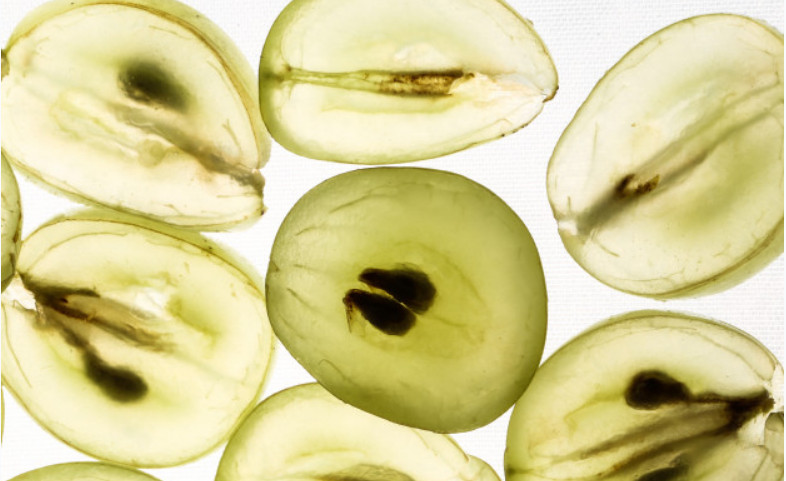How Does Grape Seed Extract Support Your Health?
Grapes are one of the most popular fruits, but many people overlook the most significant part of their health benefits — the seeds. How did humans discover the nutritional value of grape seeds? Humans have been drinking wine since grapes were planted, and although it was not initially known to the wine drinker, wine contains the phytonutrients found in the whole grape. During the fermentation process, the crushed grapes, grape seeds, stems, peels and juice (i.e. unfermented grape juice) are fermented in barrels for several weeks, and these compounds leach into the wine. This is where some of the benefits of wine come from. Can I just eat the seeds? The answer is no, and it’s not just the bitter taste. If you chew grape seeds sometimes, do you think your body can effectively absorb the whole grape seed? Some of the beneficial phytonutrients in grapes, however, are concentrated in grape seeds — grape seed extract is the answer.
The grape seeds used to make its extract usually come from wine manufacturers. Grape seed extract provides high concentrations of important phytonutrients in a form that is easier for the body to digest. It also contains only a small fraction of the total nutrients of the whole grape. Adding grapes to your diet provides you with healthy compounds such as vitamins C and K, copper, and various phytonutrients. So don’t stop eating grapes altogether, but consider ingesting grape seed extract instead. Grapeseed extract has been shown to have powerful antioxidant properties that help support normal, healthy inflammatory responses, and a growing number of studies have shown additional benefits of grapeseed extract in optimizing capillary strength.
Components of grapes seed extracts
Grapes contain a variety of phytonutrients. Maybe you’re familiar with resveratrol, which is found mainly in the skin of grapes. Researchers have investigated its possible use in treating cancer, heart disease, and other conditions. It has been shown to be a promising anticancer agent. To make matters more complicated, different grape varieties, growing seasons and areas of origin can also cause inconsistent levels of these beneficial compounds.
Besides being a source of vitamin A, which is essential for the production of white blood cells and for the formation of new collagen, grape seed extract also contains procyanidins, which are antioxidants. The potency of a product will vary, but grape seed extract generally contains between 95 and 100 percent procyanidins. It is important to note that the number of procyanidins present in grape seed extract will determine its quality.
Depending on the type of grape, the seeds contain 5-8% polyphenols. These compounds include epicatechin, gallocatechin, catechin, and epigallocatechin. These polyphenols are natural compounds that protect our bodies from free radicals and promote healing. Grape seed’s polyphenols have a higher antioxidant activity than vitamin C. These compounds have also been found to have potent anti-inflammatory and cardioprotective properties. They have also been demonstrated to exhibit anti-mutagenic properties.
The flavonoids in the grapes are believed to be responsible for their healthful effects. The antioxidant properties of these substances destroy free radicals, which are harmful to cells. In addition, they can prevent the oxidation of fats in the body. This flavonoid chemical composition is most closely associated with grape seed extract’s overall benefits, such as cardiovascular health, supporting healthy inflammation and neutralizing free radicals. In addition, The skin of grapes is high in dietary fiber, which helps lower our risk of heart disease, cancer, and obesity. It is also rich in linolenic acid, which is an unsaturated fatty acid.
The Benefits of Grape Seed Extract
Blood-thinning effect
The grape seed extract is considered a promising nutraceutical. In a recent study, researchers tested the ability of grape seed proanthocyanidins to inhibit thrombotic inflammation. Specifically, they looked at how the extract’s activity inhibited TNF-a-induced adherence of T cells to human umbilical vein endothelial cells. Grape seeds also help strengthen capillaries, arteries and veins, which improve blood circulation, thanks to proanthocyanidins in the grape extract. Over a 10-day period, 80 percent of patients who took proanthocyanidins reported improvement in a variety of symptoms. Several studies have shown that grape seed extract may reduce blood clotting and increase blood flow. These effects may also contribute to the treatment of cardiovascular diseases. However, more research is needed to determine if these effects are truly beneficial.
Wound healing
Among the many herbs and plants in nature, grape seed extract has been researched for its wound-healing properties. Its proanthocyanidins are known to facilitate wound healing due to their anti-inflammatory and antioxidant. They are also able to inhibit phospholipase A2 (PLA2), a key enzyme that produces inflammation. The proanthocyanidins in grape seed extract may also help to promote collagen fiber production. This has been shown to improve skin complexion and reduce blood vessel damage. They can also inhibit oxidative DNA damage. There is evidence that oxidative stress has been implicated in impaired wound healing.
Good for treating diabetes
“Grape seed extract and exercise training are convenient and inexpensive ways to treat diabetes complications,” the researchers found. Several studies have been conducted to determine if grape seed extract can help with weight loss. These studies have mainly focused on the effects of grape seed extract on a range of different lipid profiles. A grape seed extract has also been shown to improve lipid metabolism. This may mean that it could help to treat conditions such as diabetes and heart disease. The polyphenols and proanthocyanidins in the grape act as antioxidants, which are important for preventing the development of diseases, They can protect blood vessels and reduce oxidative stress.
Anti-cancer effects
Antioxidants in grape seed extract may help reduce the risk of cancer. Research released by Prostate has shown that proanthocyanidins inhibit the spread of prostate cancer cells while causing apoptosis (cell death) of prostate cancer cells. “Grape seed extract has been found to prevent the growth of breast, stomach, colon, prostate and lung cancer cells in test tubes. But there’s no clear evidence that it works in humans. Grape seed extract also helps prevent the damage to human liver cells caused by chemotherapy drugs.” Grape seed extract also contains a large number of compounds (proanthocyanidin dimers) that act as aromatase inhibitors. Perhaps for this reason, grape seeds are also beneficial for the prevention and treatment of cancer, especially hormone-dependent breast cancer.
Aromatase, an enzyme that converts androgens into estrogen, is expressed at higher levels in breast cancer than in normal tissue. Estrogen is an “accelerant” for many breast cancers, so many chemotherapeutic drugs work by inhibiting the activity of aromatase. Grape seed extract can produce a similar effect in a natural way.
- Dandelion Extract: What It Is, Benefits, Uses and Side Effect - April 23, 2024
- Is Berberine Extract Help For Weight Loss? - April 11, 2024
- Why Is Pysllium Husk Powder A Popular Meal Replacement Ingredient? - April 3, 2024




